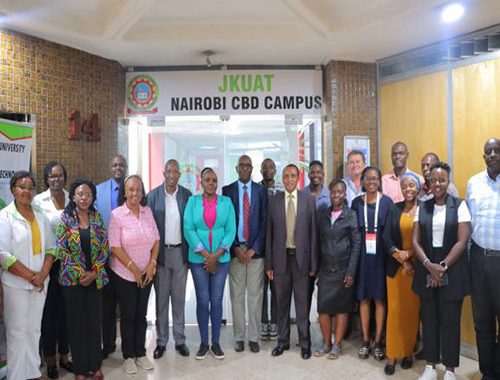At Jomo Kenyatta University of Agriculture and technologies (JKUAT), a new research initiative has been launched to improve the delivery of health services in Kenya through the use of mobile technologies. In order to promote the execution of the Kenya National eHealth Policy (2016–2030), the initiative seeks to connect patients with public health organizations and healthcare professionals.
The Kenyan government has long envisioned eHealth as part of its universal health care agenda, which views ICT adoption and utilization as essential to achieving the greatest possible standards of health.
However, a number of obstacles have stood in the way of the aspiration’s realization, chief among them being inadequate systems for managing health and medical information and the complexity of managing sensitive patient data.
Volunteer patients will test for ovulation or malaria at home as part of the research, and they will communicate the results with doctors in affiliated facilities using a mobile application (App).
In a system that guarantees the accuracy and integrity of patient data, the goal is to enable patients to receive medical diagnoses without having to travel. After that, the doctors can analyse the test results and give the patients the appropriate advice.
“EHealth programs, which include digital technologies like electronic health records (EHRs), telemedicine, mobile health apps and data analytics, offer transformative advantages in healthcare delivery leading to improved patient outcomes and operational efficiencies,” said Dr. Reuben Thuo, principal of JKUAT’s College of Health Sciences.
The African Development Bank is funding the project, which was introduced during the Ninth Tokyo International Conference on African Development (TICAD) in Yokohama, Japan, last month. It will be in operation for the next three years.
Three hospitals – Murang’a County Referral Hospital, Mama Lucy Hospital and Machakos Referral Hospital shall work together to pilot the project, which will be led by JKUAT’s Digital Health Applied Research Centre.
Over the course of the project, the participating academics will also develop the ability of healthcare professionals in partner hospitals to effectively use new technologies in the delivery of health services and make policy suggestions based on the data insights that emerge. Additionally, the group will test the usage of “MyChart” software, a specialized site that enables users to manage health data from computers or smartphones.
The initiative is the result of a partnership agreement inked in 2019 between JKUAT and the Association of African Economy & Development (AFRECO), a Japanese organization. G Cube Co. Ltd. and Qunie Corporation, two more Japanese businesses, will also participate in the pilot study. The former will supply testing kits, while the latter will create project business models that might be implemented in other parts of Kenya.
According to AFRECO Secretary-General Kyoko Hasegawa, the initiative’s goals are to increase JKUAT’s capabilities as a health research center, set up systems to encourage population health awareness at all times and suggest financial and policy options to support these initiatives. Ms. Hasegawa continued, “We see this project as a catalyst for JKUAT to develop into a healthcare information center and beyond.”

